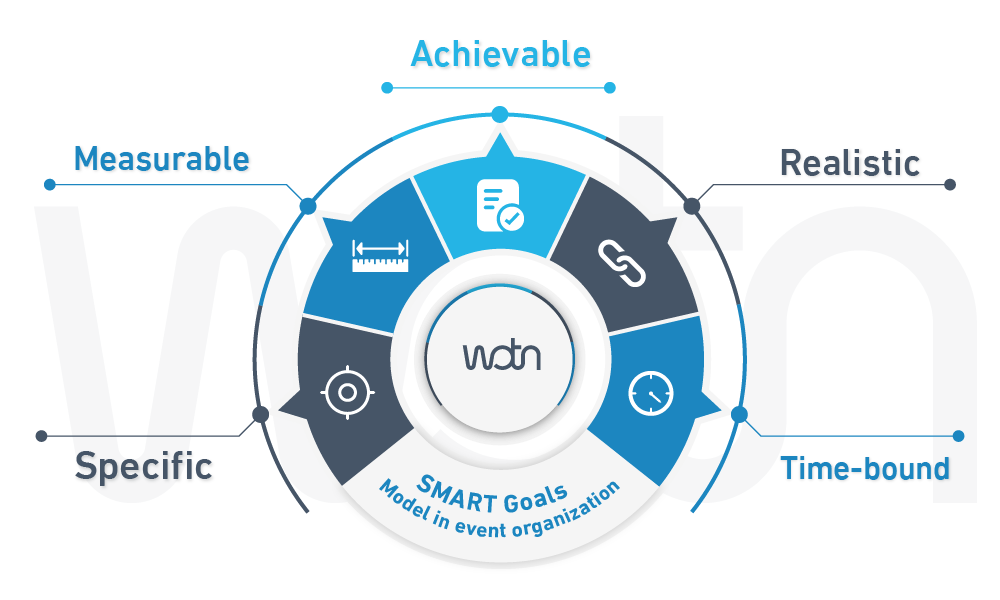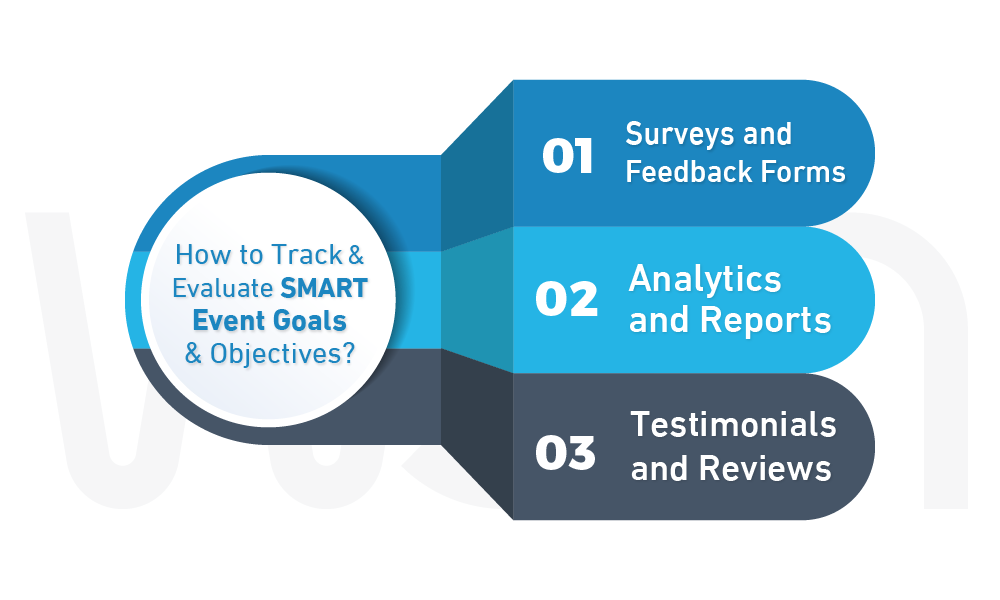Your Vision, Delivered
Say hello to the real experience!
Bring your next event to life—guided by experience, innovation, and excellence.
Let’s create together
Have you ever pondered on what makes many events successful? Or how people go about achieving their event goals? When planning an event, having a clear vision is not enough. You also need to turn that vision into a concrete reality to Achieve Your Event Objectives. That's where SMART Goals comes in, as they assist you in defining your goals clearly and transforming them into measurable successes. This model enables you to easily track progress towards your objectives and achieve them efficiently.
Imagine you're tasked with organizing an event that will bring about significant change in your company. Whether it's launching a groundbreaking product, conducting an employee training workshop, or hosting a networking event to elevate your brand, you have a clear vision and goal in mind. However, the challenge lies in turning your aspirations into a tangible reality.
But the question that arises is how to achieve your Event objectives into a reality. This is where the SMART goal framework comes into play, serving as your guide to help you define the direction, purpose, and measurable approach that ensures all your event objectives are effectively achieved.
So, Let's delve into the SMART goals, its components, and how you can effectively apply it to plan and organize successful events. By utilizing this model, you can set SMART goals for your event, leading to its enhanced impact and success.
The SMART goals is a framework used for goal setting and evaluation. It consists of five criteria that help ensure goals are well-defined and effectively pursued. The acronym SMART stands for the following:
Read More: Planning and Managing Exhibitions: A Guide to the Success of Your Trade Exhibition

To effectively apply the SMART goals, it's essential to have a clear and specific goal that outlines precisely what you want to achieve and the steps to accomplish it. By formulating a specific goal, such as "organize a marketing webinar with a minimum attendance of 200 participants" instead of a vague goal like "organize a successful conference," you can clarify your objective and identify the direction in which you need to move. This is the first step in implementing the SMART Goals model, as a clear and specific goal serves as the foundation for achieving success in your event planning and execution.
Establishing specific and measurable goals is crucial for tracking progress and evaluating outcomes. Rather than setting a vague goal such as "increase brand awareness," it's beneficial to set a specific and measurable goal like "boost website traffic by 20% after the event." This approach enables you to set precise targets that are easy to measure, making it simpler to monitor progress towards achieving your objectives.
Realistic and achievable goals are essential for success in achieving your objectives. Setting an unrealistic goal, such as "raise $700,000 by selling 700 tickets for the Human Resources Conference, which has a seating capacity of only 500 seats," is unlikely to be achievable. Instead, setting a specific and realistic goal, such as "raise $50,000 by selling 500 tickets at $100 each," ensures that your goal is attainable with the available resources. By setting realistic and achievable goals, you can effectively implement the SMART Goals model and optimize your event planning and execution for success.
It is important to ensure that your goals are aligned with your organizational or structural objectives and support your mission and vision. Rather than setting a vague goal like "organize a large conference," it's crucial to formulate a specific and aligned goal that reflects your business aspirations, such as "organize a conference that showcases our new product line and generates new business opportunities for company growth." By setting goals that align with your company's vision and mission, you can maximize the impact of your event and achieve lasting success.
Setting a specific time frame for your event planning and execution is an essential component of the SMART goals. By establishing a clear timeline, such as a goal to increase conference attendance within a 3-month planning period, you can ensure that your objective is achievable and completed within a specified timeframe. This approach helps you stay focused, accountable, and on track to achieve your goals.
Applying the SMART goals is crucial for the success of any event. By setting clear and specific goals, you can create a roadmap for achieving your desired outcomes. When utilizing this model, certain key points must be considered, including:

While setting SMART event goals and objectives may initially appear daunting, following these a major steps can simplify the process:
As part of the SMART goals in event planning, it's crucial to ask five important questions that can help you determine the purpose and direction of your event. These questions include:
As a key component of the SMART goals in event planning, it's crucial to identify your target audience and gain an understanding of their needs, expectations, preferences, and motivations. This includes not only your team members, stakeholders, sponsors, and invited speakers but also any other key participants. Understanding your audience is paramount to creating a relevant and inspiring experience that meets their expectations.
Define your primary goal and any sub-goals for the event, ensuring that they are measurable, achievable, and aligned with your business strategy. This enables you to track progress and adjust plans as needed to optimize the success of your event.
The reason for organizing an event should be clearly defined and aligned with its vision and purpose. This involves showcasing the problem it solves or the opportunity it creates for your audience, speakers, and sponsors, emphasizing the benefits and advantages they will gain from attending or participating. By having a clear and compelling vision, the event can attract and inspire attendees, increasing its impact and overall success.
To determine the best time to host your event, it's crucial to consider various timing factors. This includes checking the calendar for important dates, determining the availability of your target audience, and ensuring that the timing is convenient to maximize attendance and engagement. By carefully considering the timing of your event, you can increase the likelihood of its success and ensure that it aligns with the schedules and preferences of your attendees.
Selecting the ideal location for your event involves evaluating various factors, such as the venue, platform, and technology requirements. It's crucial to consider the accessibility and suitability of the location, including the amenities required for the event and the number of participants. Additionally, the venue should be of high quality and reliable to provide a positive experience for attendees.
This fundamental step enables you to identify gaps, opportunities, and challenges that you may encounter in organizing the event. It helps in discovering best practices and creative ideas to ensure a successful event.
Setting SMART event goals is only the first step towards planning a successful event. You must also track and evaluate your progress and results to determine whether you have accomplished them. Fortunately, many tools and methods are available to track and evaluate your SMART event goals, depending on the type and nature of your event. Here are some commonly employed ones:

Use surveys and feedback forms to collect data and opinions from attendees, speakers, sponsors, partners, and other stakeholders before, during, and after your event. Online platforms like SurveyMonkey, Google Forms, or Eventbrite offer convenient ways to create and distribute surveys and feedback forms. Use these tools to measure metrics such as satisfaction rate, engagement rate, learning outcomes, and net promoter score.
Leverage analytics and reports to measure and analyze quantitative data and statistics associated with your event. Tools such as Google Analytics, Facebook Insights, Twitter Analytics, or Eventbrite Reports enable you to track metrics like website visits, social media engagement, email open rate, click-through rate, and conversion rate.
Collect qualitative data and feedback from attendees, speakers, sponsors, partners, and other stakeholders after your event through testimonials and reviews. Platforms such as Trustpilot, Yelp, or Facebook Reviews allow you to gather and showcase testimonials and reviews. Employ these resources to gauge metrics like brand awareness, reputation, loyalty, and referrals.
Read More: The Ultimate Guide to Virtual Events: Types and Planning Steps
In summary, The SMART goals are a key factor in achieving success in event planning. By utilizing this model, you can create an organized structure for efficiently managing events and achieving infinite success in every event you organize. It enables you to build a clear roadmap for your event planning and execution, ensuring that you achieve your desired outcomes.
At WOTN, we offer comprehensive services and precise planning to ensure the success of your event and the achievement of all its defined goals. We understand that event organization goes beyond logistics and requires an integrated strategic approach. This includes precise goal setting, creative content organization, fostering active participation among attendees, and optimizing every detail of the event to create an unforgettable experience and maximize the value and impact.
Whether you're planning a conference management, hybrid events management, virtual events management, or any other type, we are here to help. Our team of experts can assist you in every aspect of your event planning, from defining your goals to executing the event flawlessly. With WOTN as your partner, you can achieve remarkable success through the best ways. Let us help you create an unforgettable event that exceeds your expectations and achieves your goals.
Say hello to the real experience!
Bring your next event to life—guided by experience, innovation, and excellence.
Let’s create together
